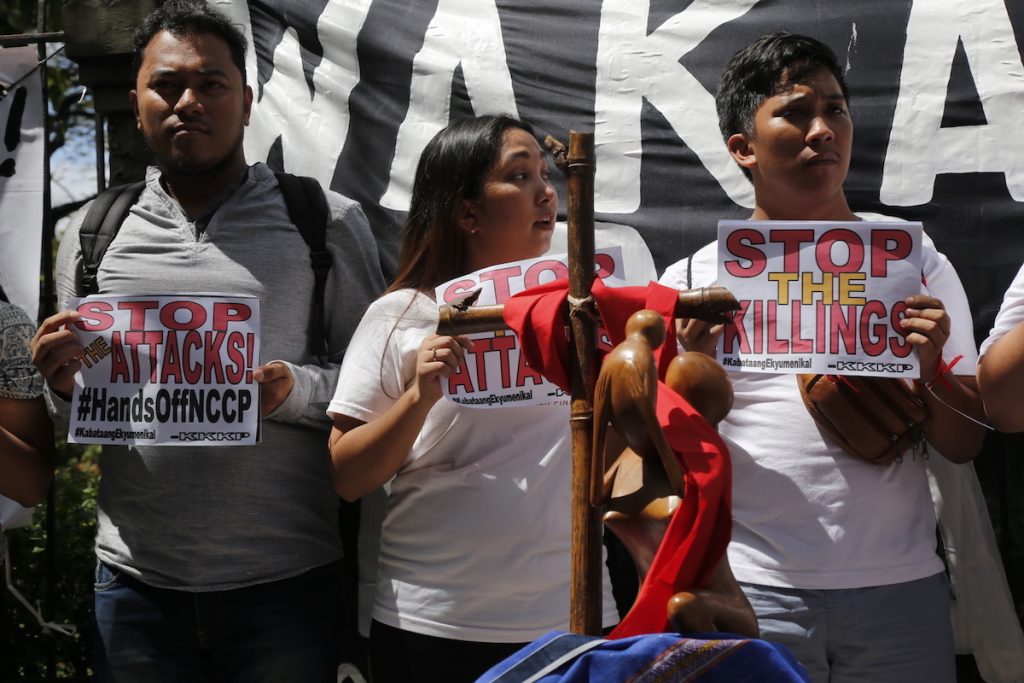Meliton “Dodong” Oso was a 25-year-old newly-ordained deacon when the 1986 “People Power Revolution” erupted in the Philippines.
After 34 years, now a monsignor, the priest still vividly recalls the days and nights when he and his fellow candidates for the priesthood fought for God and country.
He still remembers the call of the late Cardinal Jaime Sin of Manila for people to come out in the streets “to protect” the military from the wrath of a dictator.
The beloved cardinal asked people to be human shields of the men who were responsible for the implementation of martial law.
Father Oso says even the Church was not spared the iron hands of the dictator. “The Church wasn’t untouchable during those years,” he says. “In fact, we were marked.”
One night, the seminary where he was staying was shot at.
Helpless and clueless of what was happening, then-seminarian Oso stayed inside the building until sunrise.
When he and his companions checked the area the following morning, they found a dead man.
“The message was clear. If you continue with your activities, what happened to this man will also happen to you,” he recalls.
But what was meant to deter the young men instead strengthened their resolve. They became more active in demonstrations.
There was Father James Reuters, an American Jesuit, who would smuggle in newspaper clippings about the Philippines because local media outlets are being gagged.
“Every week we would get those leaflets, then we would share the news during seminars and meetings,” says Father Oso.
These days “are not very different” from the years of martial law, says the priest.
“This is virtual martial law …. Everybody’s afraid of [Philippine President Rodrigo Duterte] who succeeded in silencing the Church,” he says.
“More than 27,000 deaths and we are still quiet,” says the priest, referring to the reported victims of Duterte’s bloody war against narcotics.
“I hope we will have somebody who can really lead the Church to be very critical of what is happening in the country,” says Father Oso.
He says that with a “looming dictatorship” he cannot just hang his boots, adding that the times demand more people to be “out there” and more priests to be “more straightforward.”
The priest admits that the Filipino people seem to take a lot of time to wake up to reality.
“It took us decades before, I hope this time it won’t take us as long,” he says.
“Never forget what happened,” is the call of other Filipino church leaders.

Bishop Arturo Bastes of Sorsogon says young Filipinos should be taught in schools and churches that “we should never forget how we ousted a dictator without shedding blood.”
“It should always be ‘never again’ to dictatorship,” says Bishop Ruperto Santos of Balanga.
“As we know the maxim ‘history repeats itself,’ we have to be vigilant and to continue to safeguard our hard-earned freedom,” he adds.
“We learned our lessons from those who abused their position and power, now we have to speak and show as one people our stand against abusive, corrupt, and immoral officials,” says the prelate.
“What we have shown during those historic days … must be continued and be lived,” Bishop Santos adds.
On Feb. 25, Filipinos marked the 34th anniversary of the 1986 “People Power” uprising, a series of popular demonstrations that resulted in the ouster of Marcos on Feb. 25, 1986.
“Today, we remember such struggle,” reads a statement from the ecumenical church network “One Faith, One Nation, One Voice.”
“We are reminded that the prophetic call to side with the oppressed is still relevant and necessary,” it says, adding that the “tyrannical attacks” against the people by state agents “have been relentless.”
The group calls on the faithful to continue the “struggle for truth, justice, and peace in our land” and “denounce the evil of our present realities.”





